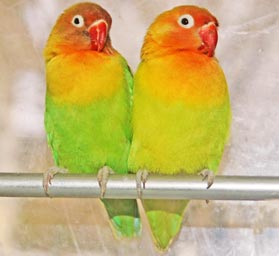
Love birds are one of the easiest birds to take care of, and are a popular choice for a “first feathered friend.”
However, many people see a pair of love birds, are so charmed by their antics, and buy them on a whim—completely unprepared for the responsibility of caring for these creatures. So before you jump in the bird bandwagon, ask yourself if you’re really ready for the daily attention they require.
First of all, how much will you spend? Aside from the birds, you will have to invest in a good cage, toys, and dishes. Food is actually not that expensive. They will eat pellets, seed, and many things you can already find in your refrigerator, like fruits, vegetables, beans, and even pasta noodles. You can also buy treats like spray millet (but only offer this once in a while, lest they ignore the other more nutritious food).
The next thing to consider is maintenance. You will have to trim their flight feathers. Love birds are quite prodigious flyers, and left on their own, they can escape or get themselves into serious trouble—just think what could happen if they became curious about the ceiling fan or air vent!
You will also need to trim their nails every 6 to 8 weeks. You can use the dog or cat clippers, or your own nail file. Your birds won’t really enjoy the procedure, but you can protect yourself from nipping by gently wrapping them in a towel. If you just can’t bear to see your love birds so upset, you can ask your vet to do this for you.
While you’re at the vet, have your love birds weighed. Watch for any sudden fluctuations in weight. Other symptoms to be concerned about are difficulty breathing, excessive sneezing, panting, or changes in behavior. If an active bird suddenly becomes lethargic, or if it refuses to eat (or eats significantly less over several days), you know there’s a problem. Also watch out for any discharge from the nares, constant puffing of feathers, or change in the consistency of droppings that lasts for more than 3 days.
But that’s not all. You have to clean the cage at least once a day. This includes removing the paper from the litter tray, washing the bowls, and sweeping off any surrounding dirt that the playful love bird may have dropped through the bars. You should also give the cage a thorough wash once a week. You’ll have to disassemble the perches and disinfect them, and scrub the plastic toys.
Aside from this, you will have to spend at last half an hour a day interacting with your pets (if you bought a pair) and at least two hours a day if you are keeping just one. Love birds are very social creatures, and will languish if left alone for most of the day.